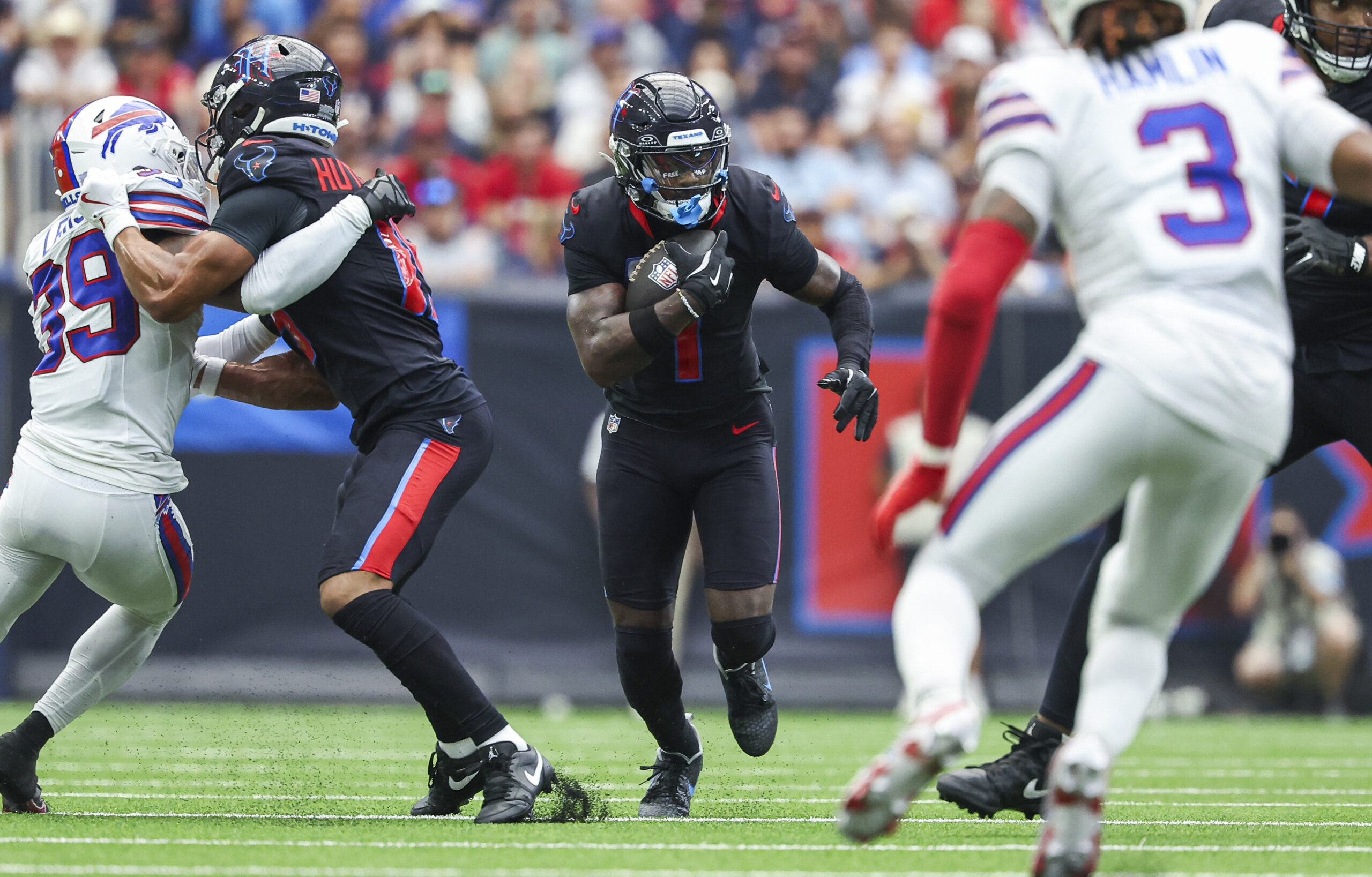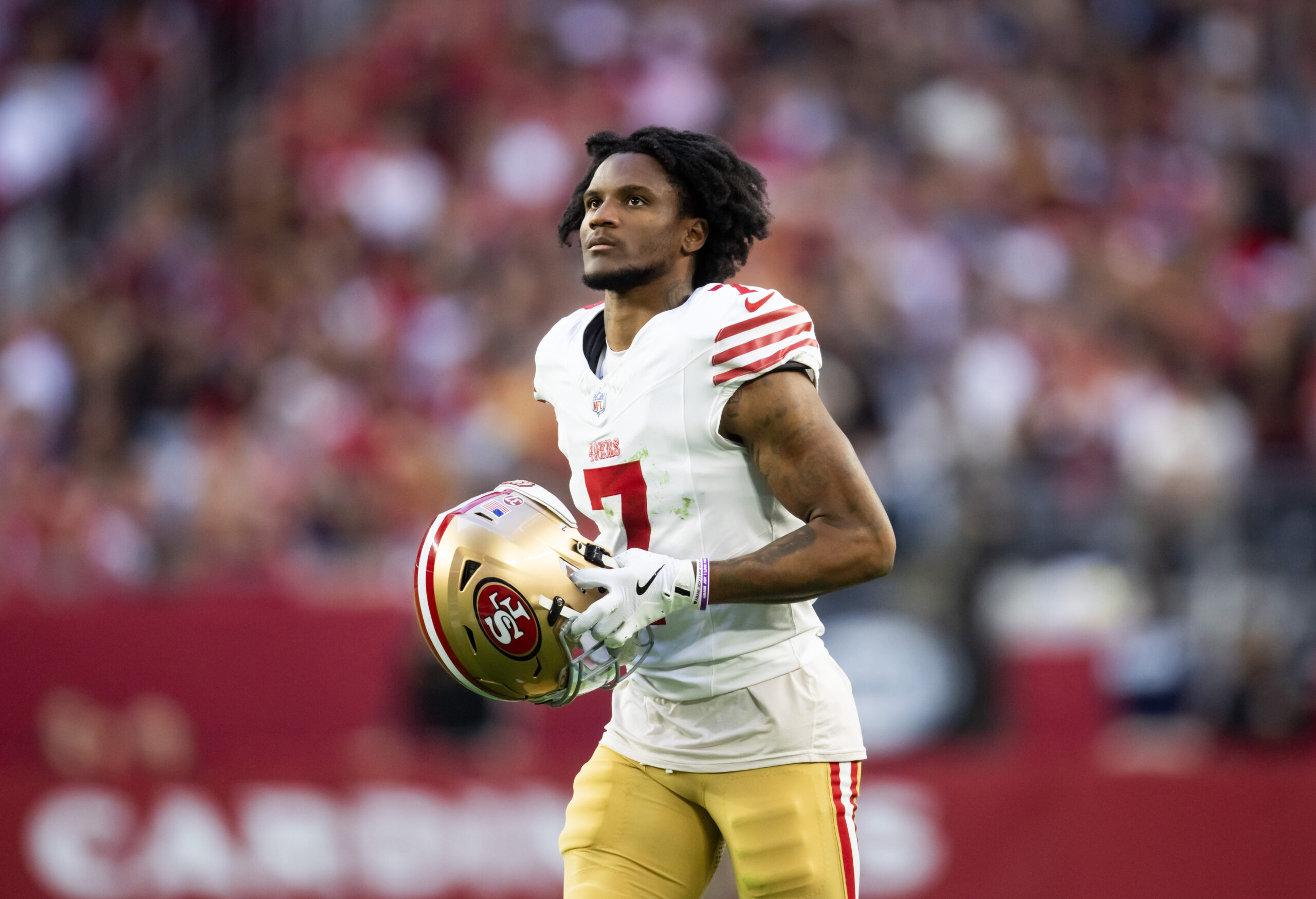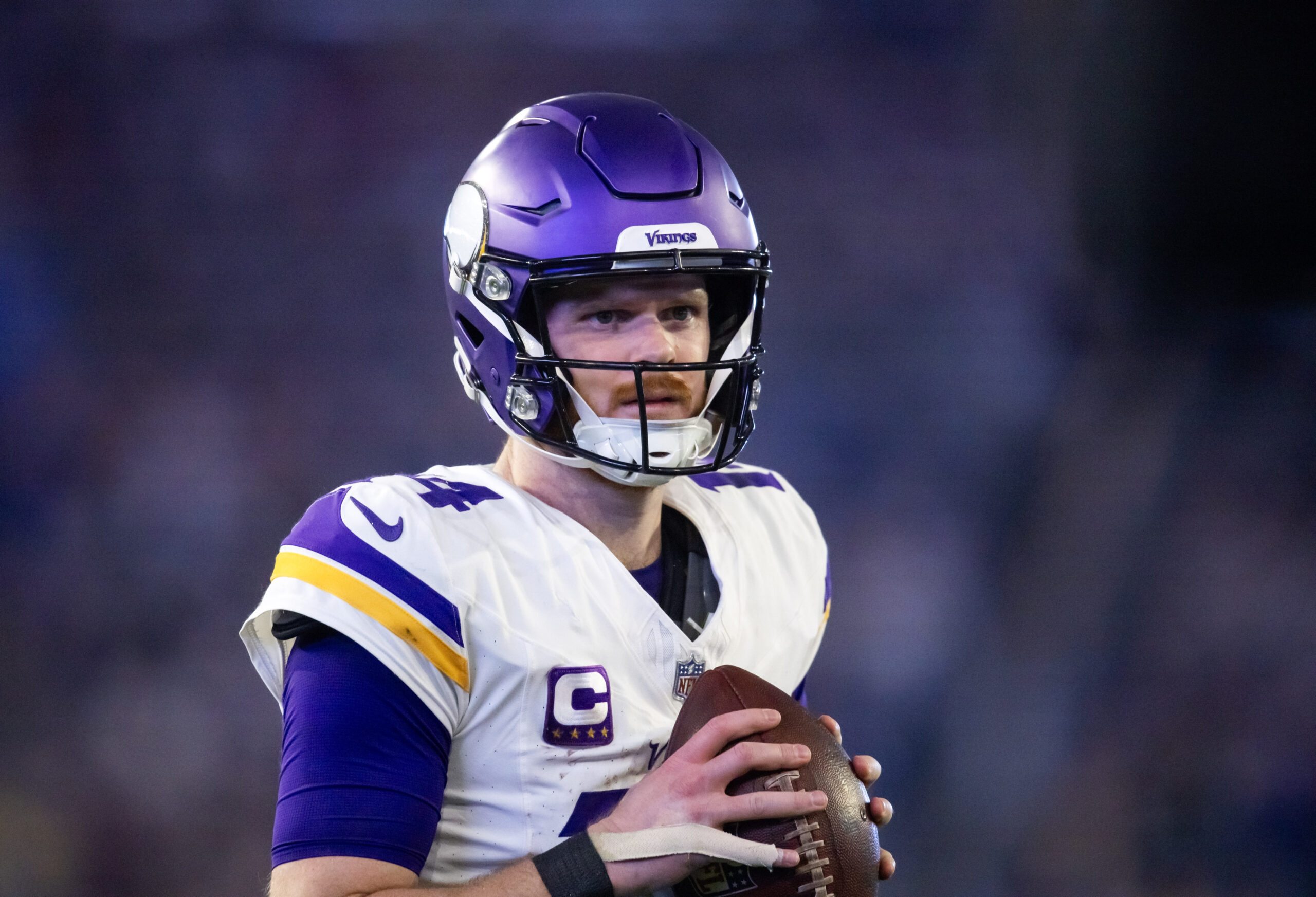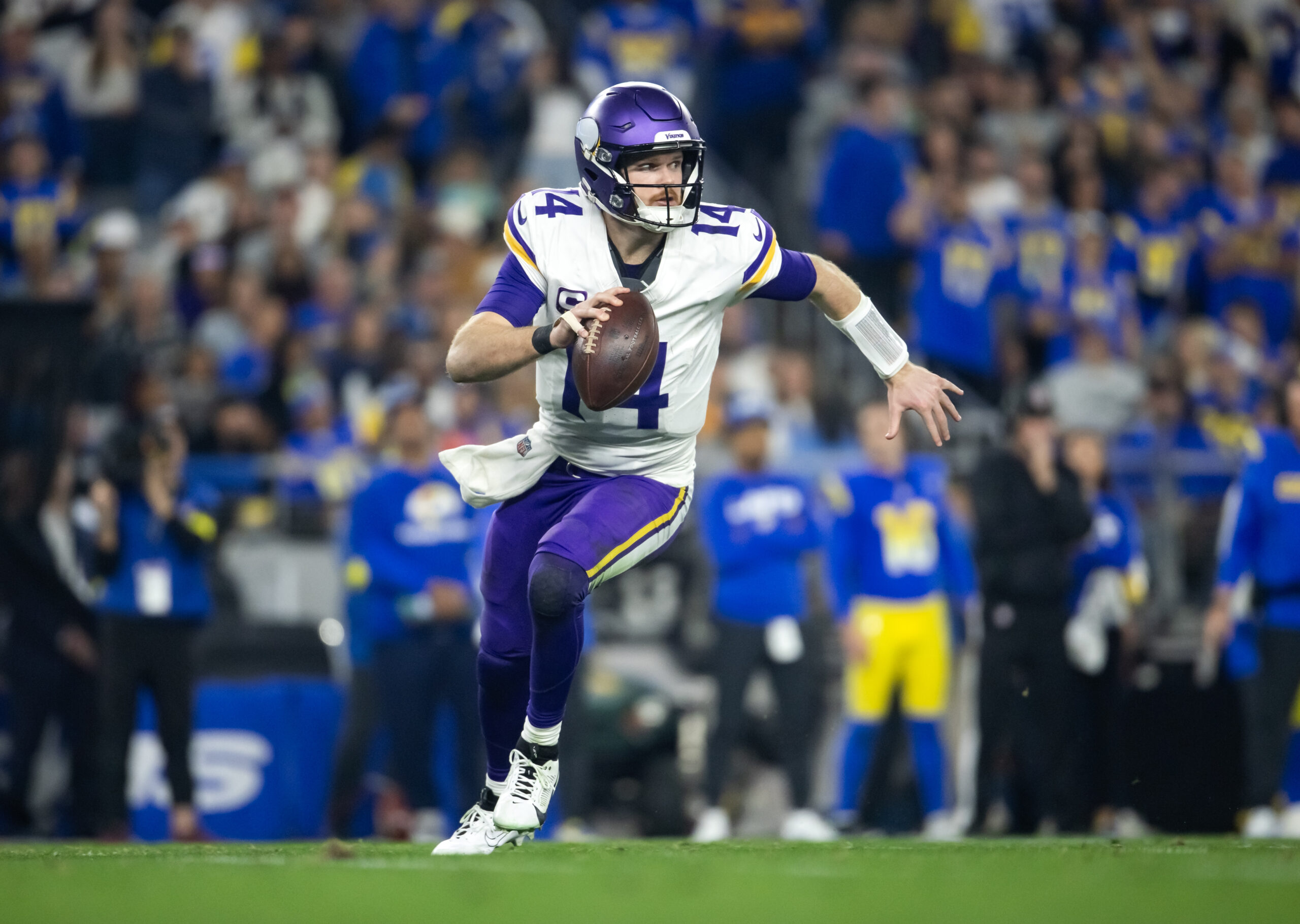NFL Analysis
9/26/24
12 min read
What's Behind NFL's Hottest Starts to 2024 Season?
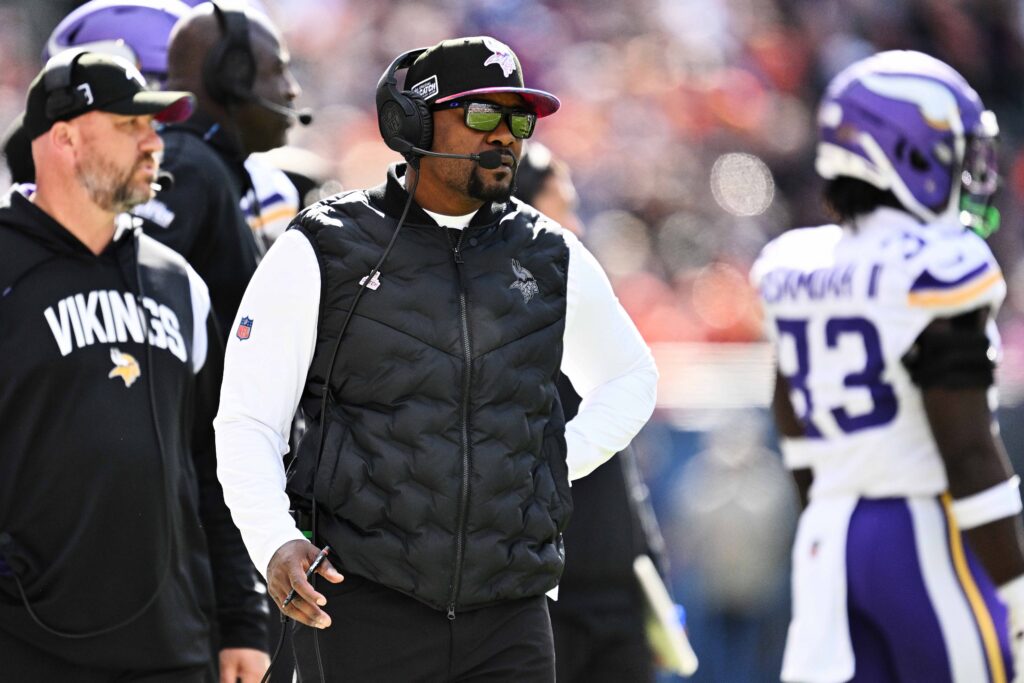
Starting the NFL season undefeated isn't easy, even when it's only three games. Today, we're looking at the most important factor for each of the five 3-0 team's hot start to the season.
For some teams, it's a coach, and for others, it's a specific position group that has gotten off to an impressive start in 2024. And, in some cases, the team's stars are simply playing up to their high standard.
What's Behind NFL's Hottest Starts
 MINNESOTA VIKINGS: Brian Flores
MINNESOTA VIKINGS: Brian Flores
After patching together a competitive unit with mediocre personnel in 2023, Brian Flores upgraded Minnesota’s defense from stingy to insurmountable. Through Week 3, the Minnesota Vikings rank second in EPA per play and have held the Giants, 49ers, and Texans to a combined 30 points.
The offseason additions of Jonathan Greenard, Andrew Van Ginkel, and Blake Cashman have paid off early, and they’ve avoided what seemed like an imminent disaster at cornerback thanks to solid play from Stephon Gilmore and Shaq Griffin. However, the driving force behind Minnesota’s defensive success is Brian Flores, the most valuable coordinator in the NFL.
Flores’ scheme is centered around disguised coverage and innovative pressure packages. Minnesota’s base coverage is Quarters, which they’ve run on 30.8 percent of defensive snaps, the highest in the league. They also rank fourth in Cover 2 usage and third in Cover 0.
What makes this scheme so difficult to decipher isn’t its reliance on split-safety coverages, it’s the confusing presentation and post-snap movement that prevents quarterbacks from getting an early read on the defensive structure.

Nobody plays as many variations of Cover 2 from as many different starting points as the Vikings.
On third down, Flores likes to call 2-invert, where the outside corners play the deep halves. Minnesota starts with seven defenders on the line of scrimmage, often in a double-mug alignment, which is designed to look like Cover 0. Post-snap, they drop out of the pressure look and rush four.
One of the limiting factors of any Tampa-2 coverage is finding a pole runner with enough speed to carry vertical routes down the seam. However, the Vikings’ primary pole-runner in 2-invert is Josh Metellus, who led defensive backs with 29 pressures last year. Metellus has much more coverage range than most linebackers, but he’s also a disruptive pass rusher and won’t be a wasted body when they do send the house.
— James Foster (@JamesFosterNFL) September 25, 2024
Flores’ favorite early-down Tampa call is 2-roll, which gives the illusion of single-high before shifting to split-safety post-snap, with the free safety and corner dropping to the deep halves.
This coverage puts an extra defender in the box for run support while maintaining the coverage benefits of 2-high. The Vikings are gapped out in the run game, and the offense is influenced to pass on first and second down.
— James Foster (@JamesFosterNFL) September 25, 2024
This is usually paired with a simulated pressure or 5-man rush and an edge defender dropping into the hook-curl. For this reason, the free safety always rotates towards the blitz side, and the corner on the away side drops.
Quarterbacks will usually target the area of the field from which pressure is coming to "replace the blitz." It’s preferable for the defense to have a flat defender squatting on that throw rather than rely on an edge rusher to fill that immediate void.
They also run a variation of 2-roll with Harrison Smith bailing from the line of scrimmage to the deep half:
— James Foster (@JamesFosterNFL) September 25, 2024
2-hole removes the need for a fast pole-runner who can get depth quickly and allows the deep middle defender to play downhill. In this coverage, the Vikings line up in an ambiguous 3-deep shell, and the middle safety (usually Metellus) robs seams and in-breakers:
— James Foster (@JamesFosterNFL) September 25, 2024
Flores’ pressure package has also evolved in 2024. Instead of living and dying by hot blitzes and Cover 0 looks, Minnesota’s playing mostly 5-down fronts with Quarters coverage behind it.
In three weeks, the Vikings have seven sacks when playing Quarters or Cover 6, three more than the next-highest team. From this base structure, Flores can call a wide range of stunts and simulated pressures while still playing sound coverage.
— James Foster (@JamesFosterNFL) September 25, 2024
Every passing down isn’t a gamble like it was last year.
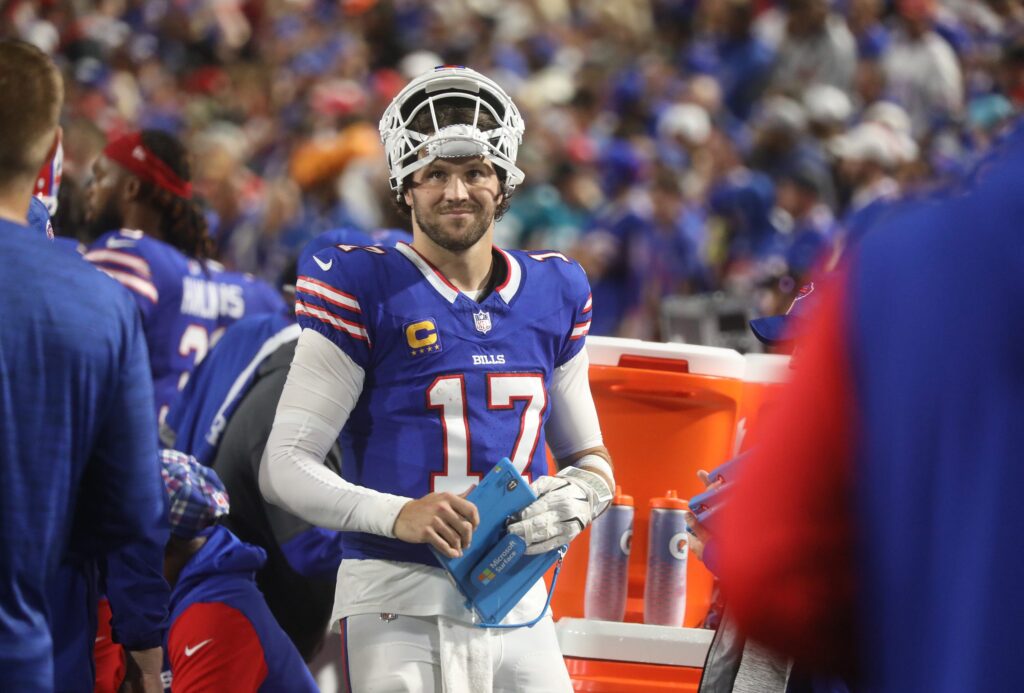
 BUFFALO BILLS: Josh Allen
BUFFALO BILLS: Josh Allen
The Buffalo Bills are firing on all cylinders, and we could point to any part of the roster as a reason for success.
Spencer Brown is following up significant improvement in Year 3 with a full-fledged breakout in Year 4. James Cook is as dynamic and elusive as he was last season, and he hasn’t fumbled. Von Miller seemed close to retirement in 2023, but he’s re-emerged as a highly effective pass rusher. Christian Benford and Ja’Marcus Ingram are a continuation of a historic late-round cornerback run from Brandon Beane.
The No. 1 key to Buffalo’s hot start, however, is Josh Allen, who is currently the best quarterback in the NFL. I can’t deny Mahomes’ playoff and late-game magic; wins aren’t a quarterback stat, but after six consecutive Championship game appearances and four Super Bowls, they kind of are.
However, evaluating the entire body of work on tape and looking at advanced metrics or traditional stats shows that Allen has been slightly better than Mahomes in the last 1.25 years.
Through Week 3, Allen has seven touchdowns, zero interceptions, and has thrown more passes that gained 12+ yards (22) than incompletions (17). His 60.4 percent success rate, 0.55 EPA per dropback, and 75 percent completion rate would all be single-season records since 2000.

His touch is noticeably improved from previous years, and he’s layering throws with more precision and finesse. There haven't been many unnecessary drive-throws or fastballs so far.
We've also never seen Allen be this accurate; he’s clearly recovered from his shoulder injury last season.
— James Foster (@JamesFosterNFL) September 25, 2024
His out-of-structure playmaking ability is rivaled only by Mahomes, but better protection has resulted in less freestyling and more surgical execution from a clean pocket.
— James Foster (@JamesFosterNFL) September 25, 2024
He’s also on pace to have the NFL's lowest pressure-to-sack percentage for the third time in the last four seasons.
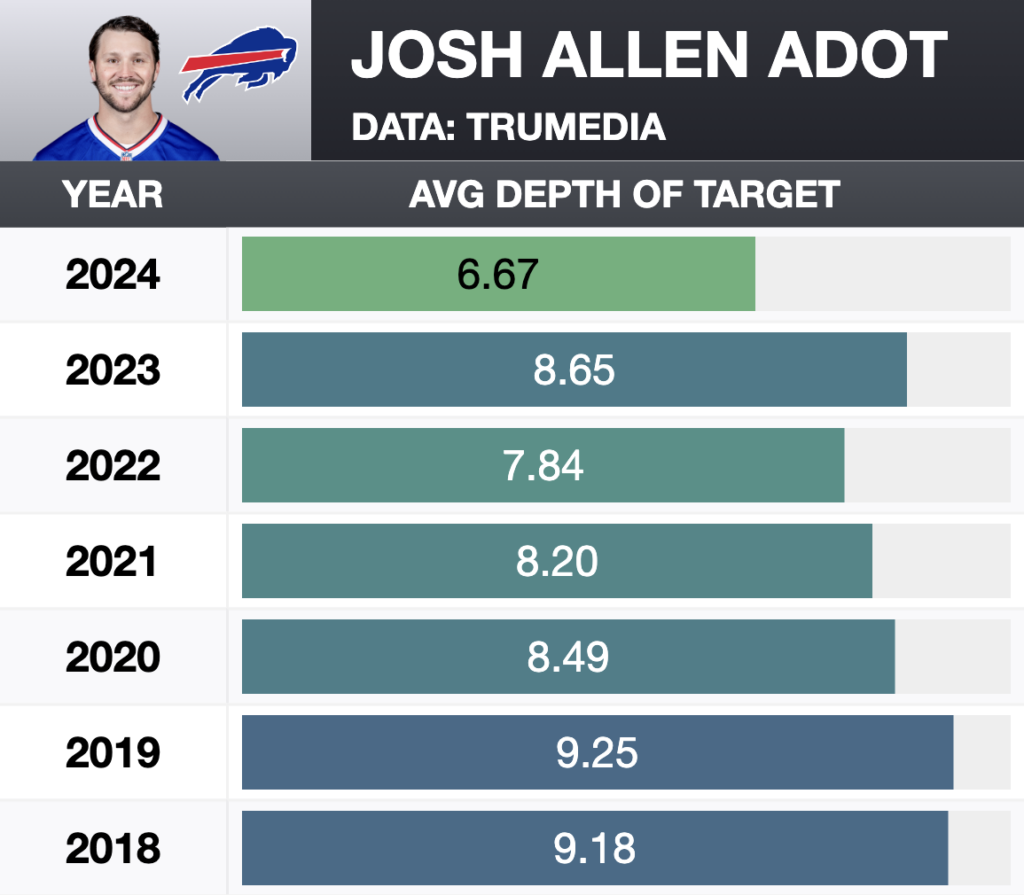
He does have a career-low average depth of target and has only attempted one pass of 40+ air yards after 16 in 2023. This is partially due to league-wide coverage trends, but there also seems to be a concerted effort by Allen and Joe Brady to run a more efficient, intermediate-focused passing game that’s less prone to turnovers.
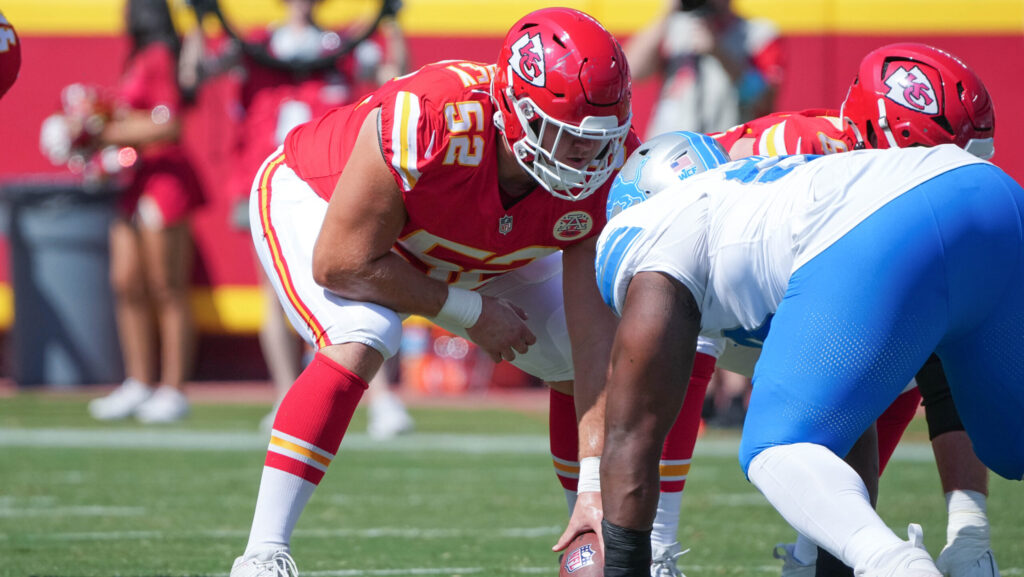
 KANSAS CITY CHIEFS - Interior Offensive Line
KANSAS CITY CHIEFS - Interior Offensive Line
Despite a 3-0 record, the Kansas City Chiefs have not played clean offensive football to start the year.
Mahomes has the most interceptions and fewest passing yards of his career in Weeks 1-3. Hollywood Brown is injured, and Travis Kelce is being held in a cryogenic chamber until the playoffs. Rookie LT Kinsley Suamataia struggled before being benched in Week 2. Still, the Chiefs have leaned on the best interior offensive line in the NFL to will them to efficiency.
Joe Thuney, Creed Humphrey, and Trey Smith have started 59 games together, and this is as good as they've ever played as a unit. Left tackle remains a concern, but the Chiefs’ interior has only allowed eight pressures and has the fourth-lowest pressure rate in the NFL.

The run blocking has been even more impressive. Kanas City runs a diverse rushing attack with a mix of outside zone, duo, inside zone, sweeps, screens, and as much power as you’ll see at the pro level.
The Chiefs rank second in rushing success rate, and their interior offensive line, particularly Humphrey and Smith, allows them to execute so many different concepts at a high level.

Humphrey is the best and most well-rounded center in the NFL. He’s forceful at the point of attack, explosive and coordinated climbing to the second level, and a special move blocker on screens and jet sweeps.
In Week 1, he had a pancake and a decisive win vs. Kyle Hamilton and Roquan Smith. In Week 2, he showed his ability to adjust to a moving target in open space.
— James Foster (@JamesFosterNFL) September 25, 2024
Smith is a quality zone blocker and by no means a one-dimensional player. His clear calling card is his drive power, which allows him to widen gaps and displace defenders off the line of scrimmage.
— James Foster (@JamesFosterNFL) September 25, 2024
And there are many examples of the entire trio harmoniously creating rushing lanes. On this wide zone run from Week 2, Smith and Thuney finish their reach blocks into the ground, and Humphrey follows with a knockdown on Logan Wilson:
— James Foster (@JamesFosterNFL) September 25, 2024
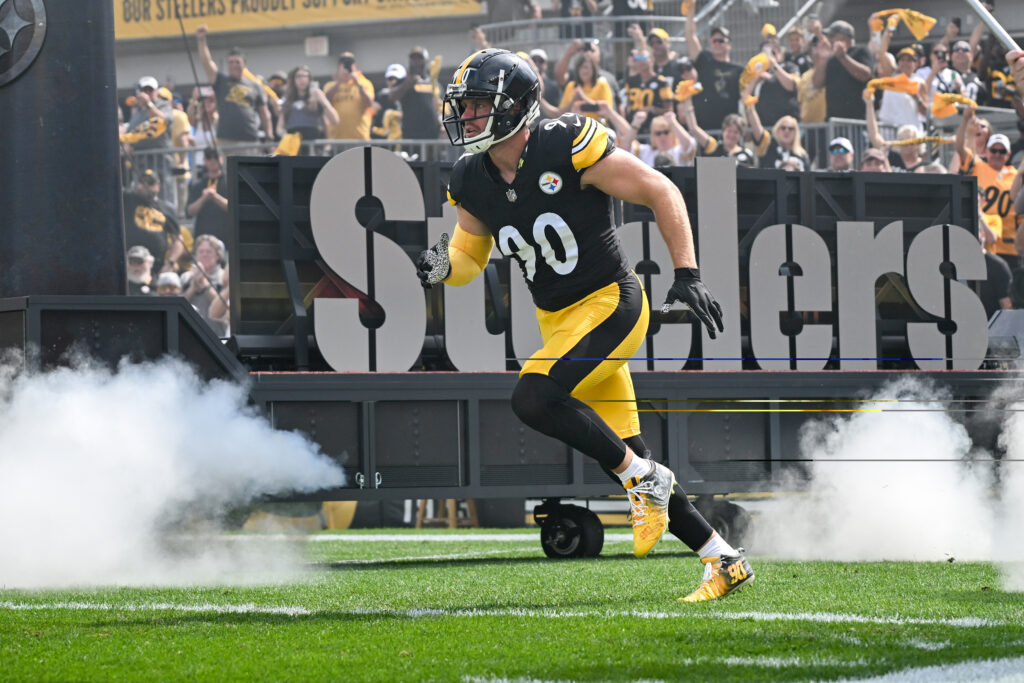
 PITTSBURGH STEELERS: Front 4
PITTSBURGH STEELERS: Front 4
The Pittsburgh Steelers’ front four has been dominant this year and is the main reason they’re undefeated.
The Steelers have the fifth-highest pressure rate (41.8%) and have allowed the second-lowest yards per rush attempt (3.5). No team can match, much less block the collective pass-rushing juice of T.J. Watt, Alex Highsmith, Cam Heyward, Keeanu Benton, and Nick Herbig.
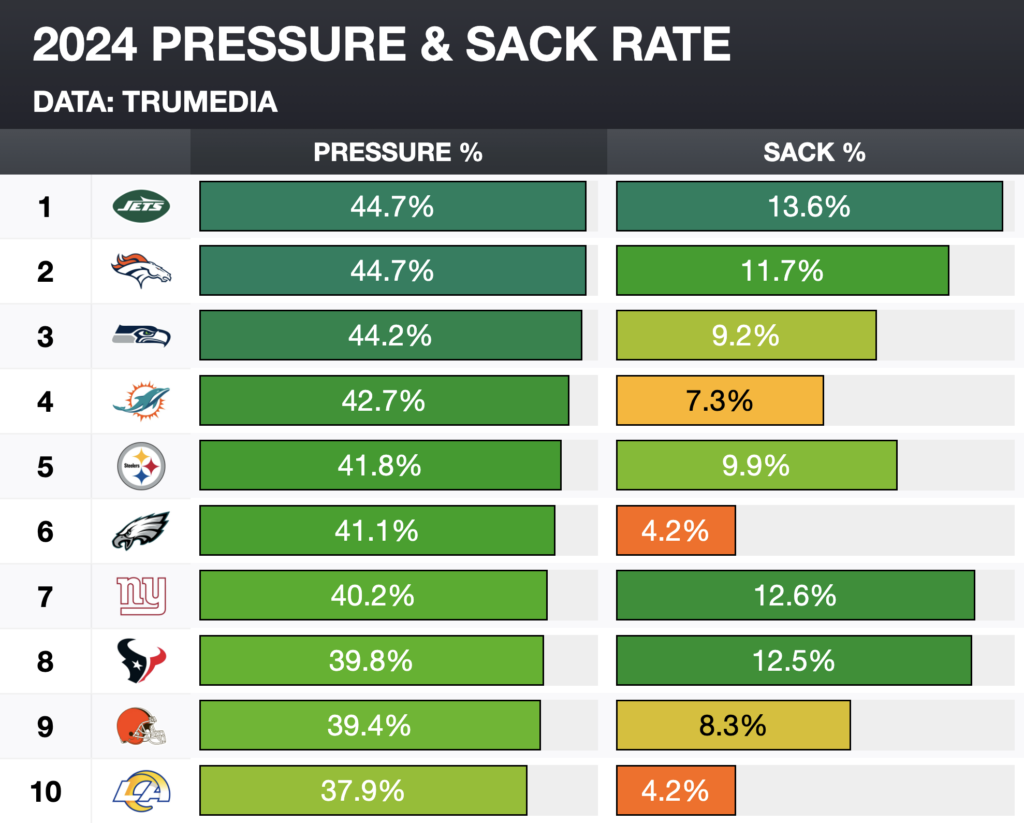
Watt, the league’s premiere sack artist, is in peak form, and his tape is actually better than the stats would suggest. He has three sacks officially, but in Week 1 he had two strip-sacks negated by penalties: an unrelated flag in the secondary and a perfectly-timed jump on the snap that was ruled offsides.
— James Foster (@JamesFosterNFL) September 25, 2024
As someone who has endorsed “almost-sacks” as a valid part of other pass rushers’ resumes, these plays should absolutely be considered in a competitive DPOY race.
Highsmith has had a somewhat slow start relative to what he did last season. He’s a similar rusher stylistically to Watt, winning primarily with a ghost rip and inside spin. Last year, however, he dramatically improved as a power rusher, recording 19 pressures with a bull rush or long arm.
That’s an element that Pittsburgh’s other edge rushers don’t really provide.
— James Foster (@JamesFosterNFL) September 25, 2024
Herbig would start for a lot of teams and is essentially a carbon copy of Watt in terms of pass-rushing plan. There aren’t many edge snaps up for grabs, but whenever Herbig sees the field, he makes game-changing plays.
He’s coming off of a monster performance in Week 3, recording a strip-sack vs. Rashawn Slater followed by a sack vs. Slater’s backup.
— James Foster (@JamesFosterNFL) September 25, 2024
After a down year in 2023 and a questionable contract extension, Cam Heyward is proving the doubters (me) wrong. He leads Pittsburgh defenders with 10 pressures and has been an unstoppable run defender.
— James Foster (@JamesFosterNFL) September 25, 2024
Heyward's successor is already on the roster and playing at a high level. Keeanu Benton had an outstanding rookie season and is one of the league's best young defensive tackles. He hasn’t recorded a sack through Week 3, but he’s winning at a high rate, so expect the finishes to come over time.
It's unclear why he’s still competing with Montravius Adams and Larry Ogunjobi for snaps, however. Benton's club move is lethal and resulted in several wins vs. Chris Lindstrom that should’ve drawn a flag:
— James Foster (@JamesFosterNFL) September 25, 2024
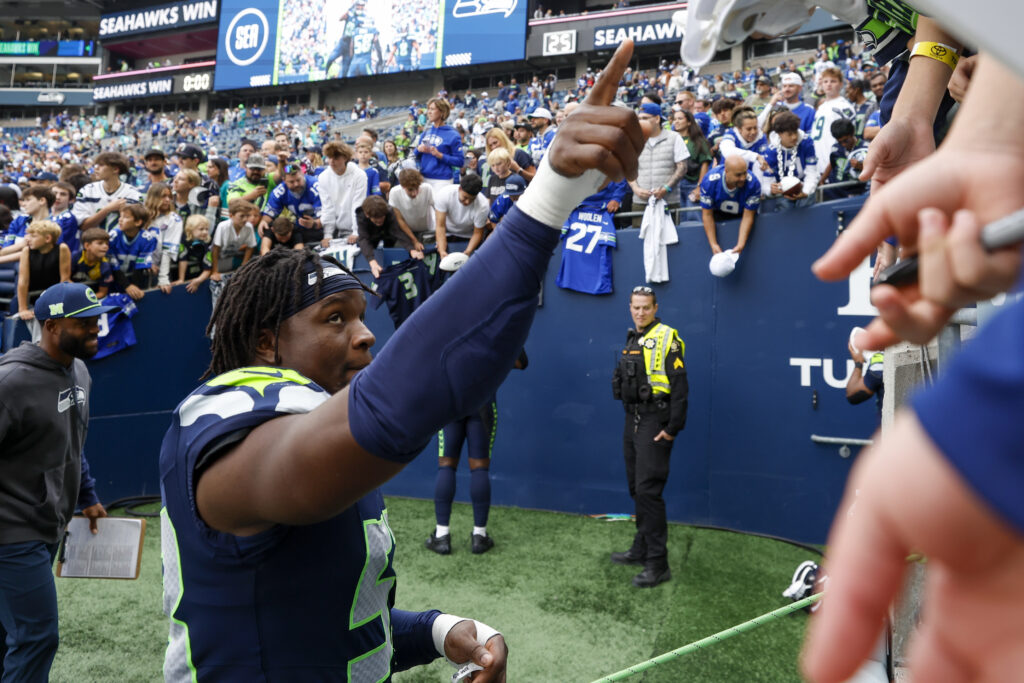
 SEATTLE SEAHAWKS: Defense
SEATTLE SEAHAWKS: Defense
The Seattle Seahawks have found the defensive resurgence they were seeking when they hired Mike MacDonald and are currently allowing the lowest success rate in the NFL.
They have played a weak schedule, facing Bo Nix, Jacoby Brissett, and Skylar Thompson, but we're still optimistic about their defensive coaching staff and personnel.
Three Seattle defenders rank in the top 15 in pressure rate:
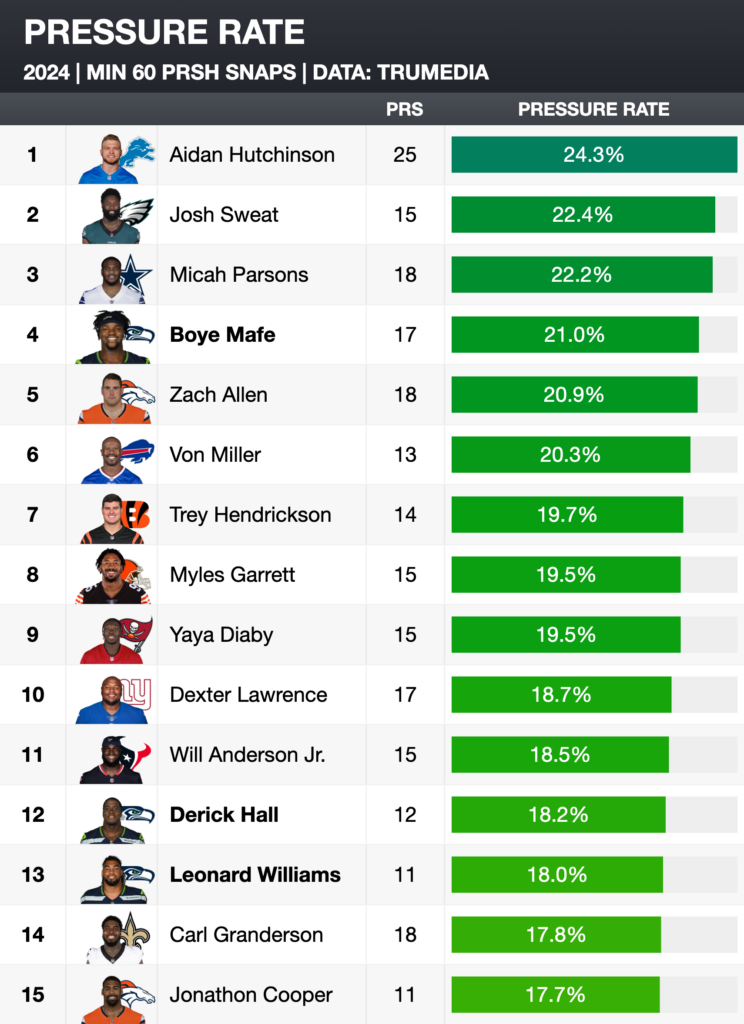
Leonard Williams and Byron Murphy were effective interior rushers to start the season, but both suffered injuries in Week 3.
Boye Mafe has a potent cross-chop and double-swipe and has 17 pressures in three games. He needs to improve his bull rush significantly to reach his potential, but he’s a proven No. 2 pass rusher with upside:
— James Foster (@JamesFosterNFL) September 25, 2024
After a quiet rookie season, Derick Hall looks primed for a second-year jump. He had a breakout performance vs. Miami and has flashed overwhelming power and explosiveness.
His bend at the top of the rush is noticeably improved from his college tape.
— James Foster (@JamesFosterNFL) September 25, 2024
The secondary is led by Riq Woolen and Devon Witherspoon, two playmaking defensive backs with elite upside. Woolen’s “regression” in 2023 was massively overstated; he didn’t repeat the interception numbers from his rookie season, but he significantly improved in down-to-down coverage consistency.
He has rare recovery speed to undercut passing lanes and eliminate leverage, which he displayed on this interception from Week 1 and numerous times throughout his career.
If you're a QB and you think your WR has inside leverage on Riq Woolen, he does not pic.twitter.com/5y5tbLQp5X
— James Foster (@NoFlagsFilm) September 25, 2024
Witherspoon is the future of the nickel position in the NFL: coverage versatility, ferocious run defense, and unparalleled physicality.
— James Foster (@JamesFosterNFL) September 25, 2024
He’s been called for four penalties so far, two of which were valid, but he had a nice PBU in Week 1 and has been a weapon in run support.


